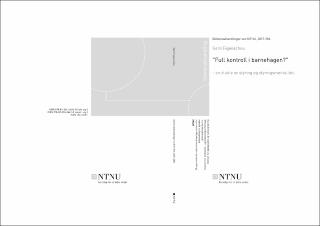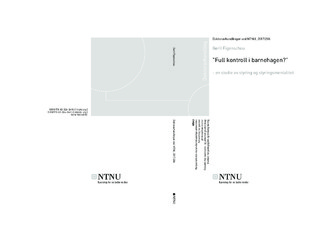| dc.contributor.advisor | Hoveid, Marit Honerød | |
| dc.contributor.author | Figenschou, Gøril | |
| dc.date.accessioned | 2017-11-09T11:45:08Z | |
| dc.date.available | 2017-11-09T11:45:08Z | |
| dc.date.issued | 2017 | |
| dc.identifier.isbn | 978-82-326-2641-0 | |
| dc.identifier.issn | 1503-8181 | |
| dc.identifier.uri | http://hdl.handle.net/11250/2465210 | |
| dc.description.abstract | Sammendrag:
Avhandlingen fokuserer på hvordan ansatte i barnehager skaper og regulerer barns (og ansattes) muligheter i barnehagen gjennom diskursive praksiser og ulike reguleringer av tid og sted. Gjennom en pragmatisk tilnærming, brukes Michel Foucaults begrep styringsmentalitet som omdreiningspunkt for analyser av et empirisk feltarbeid gjennomført i to barnehager i Finnmark. Gjennom å bruke Foucaults begrep disiplinærmakt vises det hvordan møter mellom mennesker, mennesker og sted og mennesker og tid, har regulerende og disiplinerende effekter på barn og voksne i barnehagen. De teoretiske orienteringene i denne studien er sosialkonstruksjonisme, sosiokulturell tilnærming og poststrukturalisme, de teoretiske perspektiver hentes hovedsakelig fra Foucault og andre som har videreutviklet hans teorier. Foucaults teorier bidrar i denne avhandlingen med kunnskap om og forståelse for hvordan kunnskap produseres gjennom og i diskurser. Praksiser og lingvistiske kategorier vil dermed være sosialt og historisk situert. I avhandlingen brukes Foucaults forståelser av makt, diskurser og disiplin til å analysere møter og samspill mellom mennesker i barnehagen. Det presenteres empiriske data fra et feltarbeid, som blir analysert og diskutert i forhold til det teoretiske grunnlaget for avhandlingen. Den empiriske delen av avhandlingen er delt inn i fire kapitler; hvorav tre omhandler ulike aspekter av hvordan styring og regulering foregår i barnehagen og et siste avsluttende kapittel som oppsummerer studiens funn gjennom en diskusjon relatert til hovedspørsmålet: Hvordan foregår styring av barn og ansatte i barnehagen gjennom barnehagens styringsmentalitet? Avhandlingen viser hvordan både barn og ansatte inngår i og skaper regulerende mønstre for hva som regnes som «god barnehageatferd» i barnehagehverdagen. Både barn og ansatte møter ulike reguleringer av hva som blir regnet som normalt å gjøre, og blir regulertgjennom et nett av ulike styringsteknikker som omfatter reguleringer av rom,tid og kropp. Ulike teknikker for styring som sjelden opererer alene, men i relasjon til hverandre. Det brukes ulike typer reguleringer overfor barn fordi barna beskrives som forskjellige, og ulikhetene baseres på egenskapertilskrevet det enkelte barn. Gjennom de egenskapene barn blir tilskrevet av personalet, konstruerer personalet noen forventninger knyttet til hva det enkelte barn kan eller har mulighet til å gjøre. De styringsteknikkene som brukes opptrer ikke i et vakuum, men vil være styrt av barnehagens styringsmentalitet. | nb_NO |
| dc.description.abstract | Summary:
The dissertation focuses on how employees in kindergartens create and regulate children's (and employees) opportunities in kindergarten through discursive practices and different regulations of time and place. Through a pragmatic approach, Michel Foucault's term is used as the basis for the analysis of empirical fieldwork carried out in two kindergartens in Finnmark. Using Foucault's concept of disciplinary power, it is shown how meetings between people, people and place and people and time have regulatory and disciplinary effects on children and employees in the kindergarten. The theoretical orientations in this study are social constructionism, socio-cultural approach and poststructuralism, the theoretical perspectives are obtained mainly from Foucault and others who have further developed his theories. Foucault's theories contribute in this dissertation with knowledge and understanding of how knowledge is produced through and in discourses, that is, practices and linguistic categories that are socially and historically situated. The dissertation uses Foucault's understanding of power, discourses and discipline to analyze meetings and interaction between people in kindergarten. Empirical data is presented from fieldwork, which is analyzed and discussed in relation to the theoretical basis for the dissertation. The empirical part of the dissertation is divided into four chapters; three of which deal with different aspects of how governance and regulation take place in the kindergarten, and a final chapter that summarizes the findings of the study through a discussion related to the main question: “How does the kindergarten’s governmentality influence the management of children and employees in the kindergarten?” The dissertation shows how both children and employees enter into and create regulatory patterns for what is considered "good kindergarten behavior". Both children and employees meet different regulations that are considered to be normal, and are regulated through a network of different management techniques that include place, time and body regulations. These are various techniques of power that rarely operate alone, but in relation to each other. Different types of child-based regulations are used because the children are described as different, and the inequalities are based on attributes ascribed to the individual child. Through the characteristics of the children given by the employees, the employees constructs, expectations related to what the individual child may or has the opportunity to do. The techniques of power used do not act in a vacuum, but will be controlled by the kindergarten´s governmentality. | nb_NO |
| dc.language.iso | eng | nb_NO |
| dc.publisher | NTNU | nb_NO |
| dc.relation.ispartofseries | Doktoravhandlinger ved NTNU;2017:286 | |
| dc.title | "Full kontroll i barnehagen?" - en studie av styring og styringsmentalitet. | nb_NO |
| dc.type | Doctoral thesis | nb_NO |
| dc.subject.nsi | VDP::Social science: 200::Education: 280 | nb_NO |
| dc.description.localcode | Digital fulltext not available | nb_NO |

